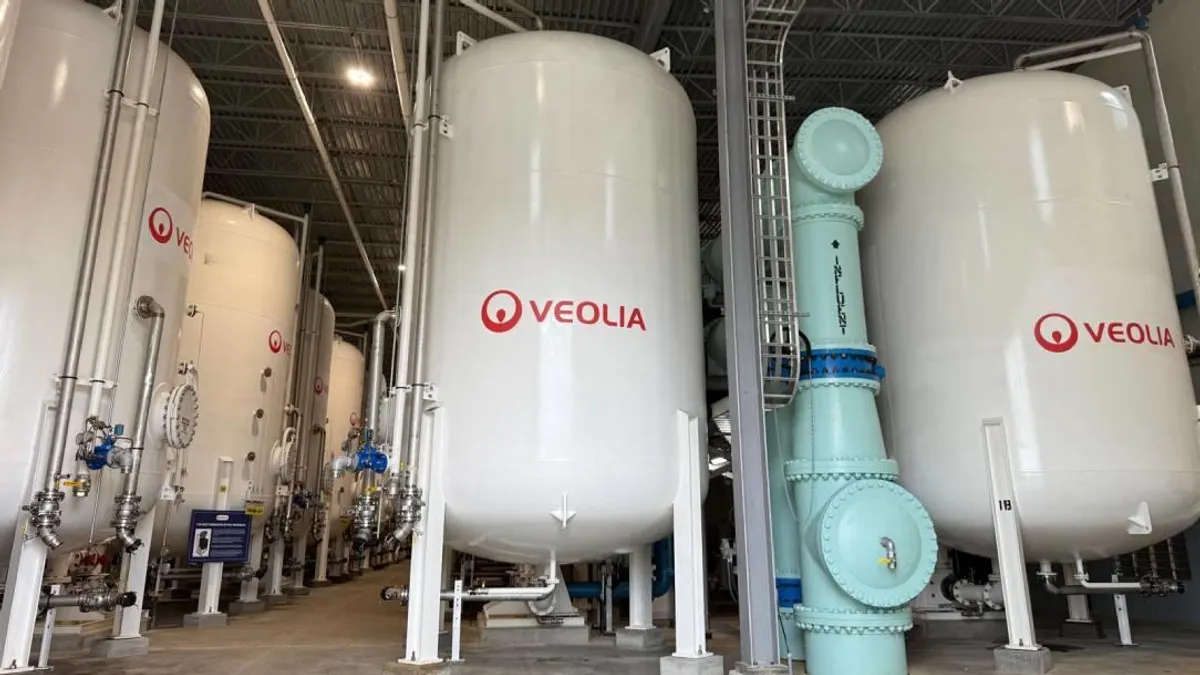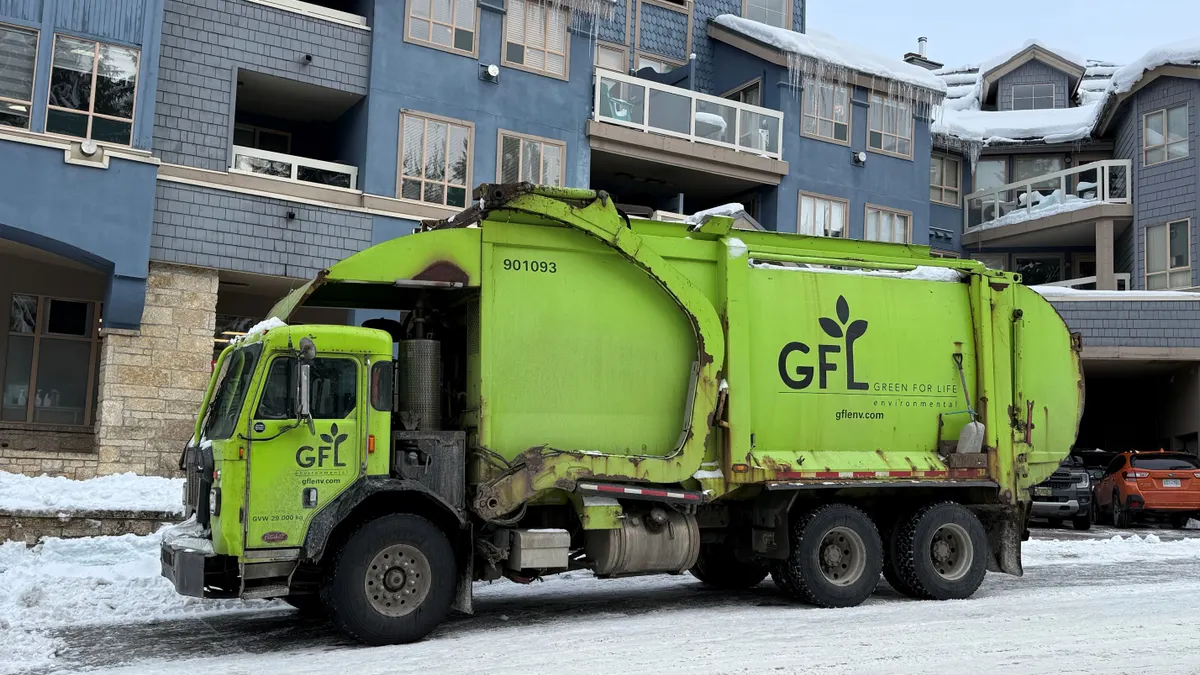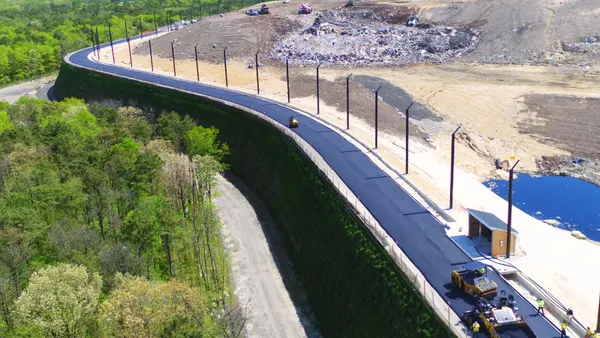Dive Brief:
- France-based environmental services company Veolia is investing heavily in its U.S. market in the coming years, aiming for 50% growth. The company says U.S. PFAS regulations, paired with consumer anxieties over PFAS pollution, are likely to contribute to that expansion.
- Veolia’s PFAS remediation technologies, which include water treatment, incineration, landfilling and deep well injection, are expected to grow in the U.S. regardless of “whatever happens in the political agenda,” said CEO Estelle Brachlianoff during a business innovation event in Washington, D.C. on Wednesday, hosted by the U.S. Chamber of Commerce.
- Veolia also announced it has opened a $35 million PFAS treatment plant in Delaware, meant to remove regulated per- and polyfluoroalkyl substances from about 30 million gallons of water a day. It’s part of the company’s goal to develop more than 100 treatment sites in the U.S. as part of its BeyondPFAS services portfolio, it said in a news release.
Dive Insight:
Veolia, which describes itself as the largest private water operator in the U.S., aims to become a major name in domestic PFAS remediation through its Veolia North America division. Brachlianoff said Veolia has doubled its growth in the U.S. market in the last five years and expects continued demand for its PFAS management services in coming years.
That work is on track even after the U.S. EPA last month said it would roll back significant parts of the National Primary Drinking Water Regulation by rescinding four of the six PFAS chemicals named in the measure, she said.
“We’ve tested with some surveys and found that 70% of the American population is very anxious about PFAS … and is asking for something to be done about it,” she said. Some states still have their own PFAS-related air and water treatment regulations, which Veolia and other waste industry companies must comply with.
Veolia said it began work on its new Stanton, Delaware, PFAS system in early 2022, which was before the EPA set the new PFAS drinking water regulations that were later rolled back. The 17,600-square-foot facility uses about 40,000 pounds of granular activated carbon to filter and absorb certain PFAS compounds. Veolia has 32 other such facilities in the U.S.
The new plant includes a laboratory Veolia says will be used to “continually test new filtration media and treatment methods,” which could lead to lower-cost PFAS remediation offerings.
The waste industry closely follows how PFAS is regulated in drinking water rules because of how the rules might affect leachate management and groundwater monitoring efforts, as well as how these facilities interact with wastewater treatment facilities. The regulations also represent business opportunities for waste companies that service industrial clients.
Veolia’s new investments in PFAS management build on those it has already made over the last year. Last fall, it launched BeyondPFAS, a set of treatment and compliance services for businesses and municipalities looking for “comprehensive” PFAS management assistance. In May, it touted its incineration facilities’ ability to destroy more than 99% of specific PFAS.
Veolia says it’s also contributing PFAS management research to the U.S. EPA. The agency last month said it will make more frequent updates to its guidance on PFAS destruction and disposal methods, which aims to list the most up-to-date science for each kind of technology. The update process, currently scheduled for every three years, will now take place annually.
Other presenters at the U.S. Chamber’s business innovation event, such as those representing the American Chemistry Council and Chemours, pushed back on the public perception that all PFAS are dangerous. They noted that the chemical class has hundreds of types of PFAS that play a critical role in American manufacturing.
The EPA has said exposure to specific PFAS can cause numerous health problems. Last year, it determined that two such PFAS, known as PFOA and PFOS, are hazardous substances. The agency will continue regulating PFOA and PFOS in drinking water, but it rescinded regulations for four other kinds: PFHxS, PFNA, PFBS and HFPO-DA, commonly known as GenX.
During the Chamber event, Bianca Hydutsky, global technology director of advanced performance materials for Chemours, showed the audience a length of plastic tubing she said was a “fundamental” component of plumbing for semiconductor fabrication facilities. “I can hold onto this [tubing] all day and I'm going to be all right. This is made from 100% PFAS,” she said.
She called for regulatory conversations around PFAS regulation to include more specific science for “what it is, what it's going to do, where it's going to be used, and what are the potential exposure mechanisms” of each chemical instead of discussing or regulating all PFAS as one group.
Chemours and other chemical companies have faced lawsuits in Ohio and West Virginia related to claims the companies contaminated communities’ drinking water with PFAS chemicals.
Though PFAS management is one part of Veolia’s portfolio, Brachlianoff said U.S. business growth could also be driven by industries with increased water demand, such as data centers and domestic lithium mining. Veolia also offers water recycling and desalination services, she said.














